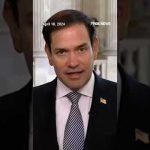**Trump’s Diplomatic Chess Moves and the Surprise of “Martyr’s Day”**
In a world as tumultuous as a cat in a room full of rocking chairs, diplomacy takes on a pivotal role in maintaining peace. Recently, the spotlight has shone brightly on former President Donald Trump as he once again steps into the global arena, reconnecting with world leaders during a contentious time. Veteran Chad Robichaux, founder of the Mighty Oaks Foundation, highlighted that Trump had simultaneously addressed leader calls from the Middle East and even managed to speak with the notorious Vladimir Putin. Amid conflicts in Ukraine and rising tensions in Gaza, many are curious about what Trump’s triage of communication will mean for global peace.
So, what made Trump’s diplomatic approach so effective during his presidency? Chad Robichaux is ready to spill the beans. He argues that Trump’s true superpower isn’t just the military might of the U.S., but rather his extraordinary negotiating skills. During Trump’s four-year tenure, nations listened closely; when the White House speaks, everyone perks up — much like a dog at the sound of a can opener. Trump’s confrontation with the bipartisan foreign policy established by President Biden now sets the stage for a refreshing recast of peace talks, especially concerning the war in Ukraine.
Robichaux, who knows his way around Ukraine better than most after ten visits there, criticized the Biden administration for what he thinks was a failure that allowed Putin to flex his muscle. With the removal of U.S. consulates and troops, Ukrainians were left open to Putin’s shenanigans. Now, as Trump stands with a foot in both camps of diplomacy and international aid, there are optimistic whispers about a potential ceasefire. Who wouldn’t want to see Trump concertedly working towards humanitarian efforts like an overzealous mom trying to organize a playdate?
But wait, the drama escalates! On the day that honors American Veterans, when individuals reflect on bravery and sacrifice, a group of students at an elite university, Columbia, floated a flyer on social media reshaping the meaning of the day to “Martyr’s Day.” This caused quite an uproar, transforming the atmosphere from respectful reflection to a surprising contention. Robichaux did not hold back, denouncing the students’ decision and calling it “manufactured outrage.” He lambasted this display of misguided priorities as a symptom of spoiled young adults who seem more focused on hip philosophical debates than the reality of sacrifice laid down by those who served.
Curiously enough, while these students exercise their freedom of expression — an opportunity afforded to them by veterans’ sacrifices — Robichaux pushed back hard against what he sees as an inappropriate recognition of terrorists. He avowed the importance of honoring true patriots who stood firm in the face of adversities that protect freedoms that allow for such protests. Irony is indeed a wonderful thing, isn’t it? A student movement ironically unravels while the backdrop reflects the sacrifices made by veterans.
In conclusion, the swirling tides of international diplomacy and local expressions of freedom continue to intertwine in the American narrative. As Trump prepares to potentially steer the ship towards a peaceful route with his global engagements, Americans are reminded of how essential it is to treasure and respect their veterans. After all, whether navigating the complexities of foreign policy or wrestling with the freedoms we hold dear, it is clear: the stakes are immensely high. So, buckle up, folks! The diplomatic rollercoaster is just getting started.




